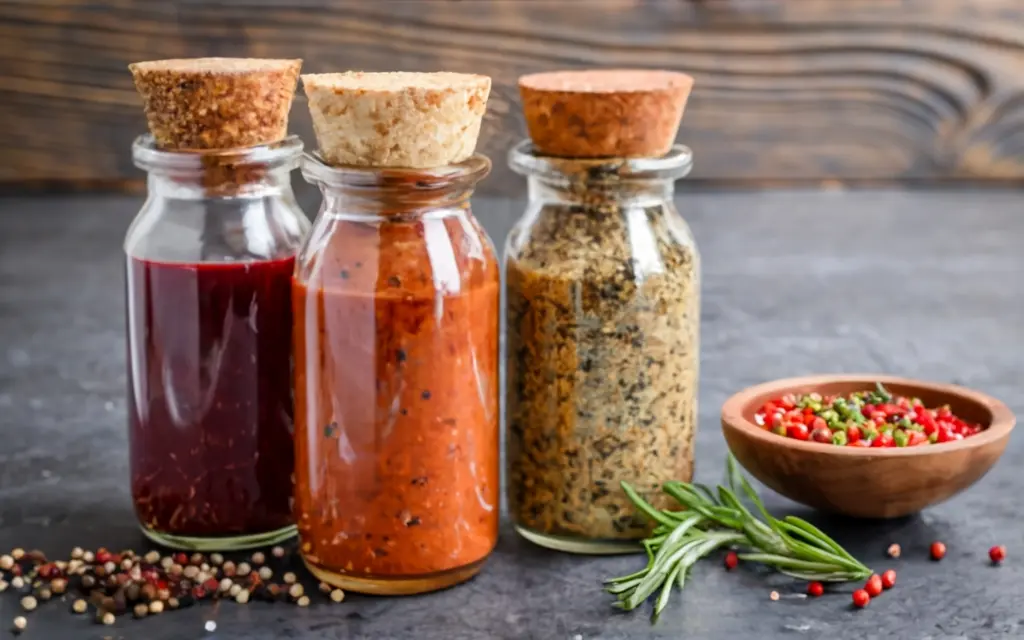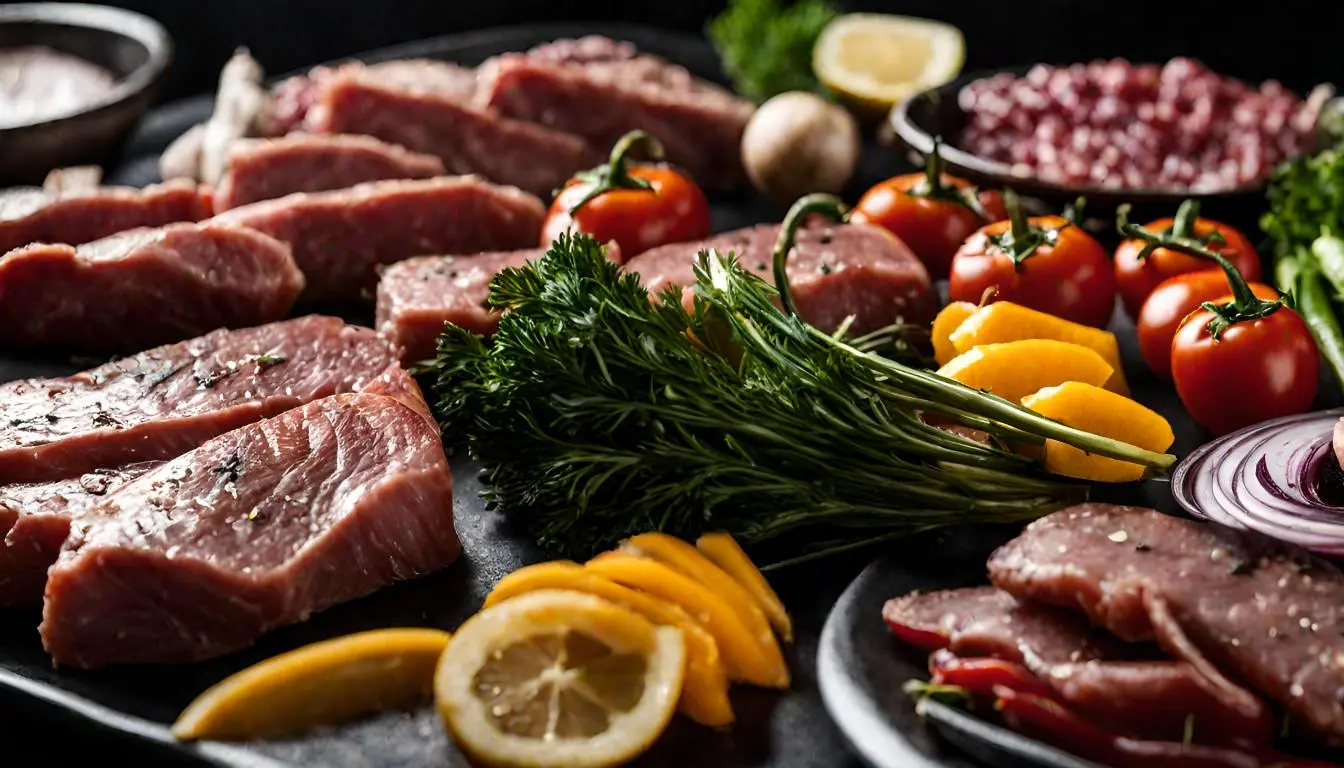Introduction to What Liquid is Best for Marinade?
Marinades transform ordinary ingredients into extraordinary dishes. A crucial question is, “What liquid is best for marinade?” This article explores the world of marinades, focusing on liquids that elevate flavors and tenderize meats. and infuse dishes with unforgettable tastes. From traditional to innovative, we’ll uncover the secrets behind the most effective marinade liquids, ensuring your next culinary adventure is both flavorful and fulfilling.
Discovering Ideal Marinade Liquids
The Essence of Marinade Liquids
Marinades are more than just flavor enhancers; they’re a blend of science and art. The right liquid can make all the difference, determining whether your dish is merely good or truly great. But what makes a liquid ideal for marinating? It’s a combination of acidity, oil, and seasoning, each playing a pivotal role in the marinating process. Acids like vinegar or citrus juice tenderize the meat by breaking down proteins, while oils help to infuse flavors and keep the meat moist during cooking.
Cultural Significance of Marinade Choices
Marinades are not just about taste; they’re steeped in tradition and culture. Across the globe, different cultures have developed unique marinade recipes that reflect their culinary heritage. For instance, in Asian cuisine, soy sauce and rice vinegar are popular, while Mediterranean recipes often call for olive oil and lemon juice. Understanding these cultural nuances can add depth and authenticity to your cooking.
Essential Components of a Marinade
Selecting the Best Marinading Solutions
A marinade is a symphony of flavors, and understanding its components is key to achieving culinary harmony. The best marinading solutions strike a balance between oil, acid, and seasonings, each contributing to the overall taste and effectiveness of the marinade.
The Role of Oil in Effective Marinades

Oil is a crucial component of any marinade. It helps to carry fat-soluble flavors into the meat and forms a coating that keeps moisture locked in during cooking. Oils like olive, canola, or sesame each add their unique flavor profiles, enhancing the overall taste of the dish. For a deeper understanding of how different oils impact marinade flavors
Acids and Their Impact in Marinades
Acids, such as vinegar, lemon juice, or wine, are responsible for tenderizing the meat by breaking down proteins. This process allows flavors to penetrate deeper, resulting in more flavorful and tender meat. However, the type and amount of acid used can vary greatly depending on the recipe and desired outcome. For a comprehensive guide on how acids affect marinating, The Complete Guide to Marinades provides valuable information.
Balancing Sweetness and Saltiness

Sweeteners like sugar or honey and salts such as kosher or sea salt play a vital role in balancing the flavors of a marinade. They not only enhance the taste but also aid in the caramelization of the meat’s surface during cooking, adding a delightful texture and color to the dish. Understanding the delicate balance of these components is crucial for creating a successful marinade.
Types of Marinades
Exploring Optimal Marinade Choices
Marinades come in an array of types, each suited for different culinary needs. Understanding these variations is key to selecting the optimal marinade choice for your dish, whether you’re aiming for a subtle flavor enhancement or a deep, robust infusion.
Traditional vs. Modern Marinade Fluids
Traditional marinades often rely on classic ingredients like olive oil, vinegar, and citrus juices, which have stood the test of time in kitchens around the world. Modern marinades, however, are not afraid to experiment. Ingredients like pomegranate juice, balsamic glaze, or even coffee can be found in contemporary recipes, offering a new twist on the classic marinade. For a look at how traditional and modern marinades differ, Marinades Demystified: How, When, and Why to Marinate, provides a comprehensive comparison.
Tailoring Marinades for Various Foods

Different foods require different marinade approaches. For instance, delicate fish benefits from lighter, citrus-based marinades, while tougher cuts of meat can handle heartier, vinegar or soy-based marinades. Vegetables, on the other hand, are versatile and can be enhanced with a variety of marinade types, depending on the desired flavor profile.
Marinating Techniques
Mastering Top Marinade Fluids
Effective marinating is as much about technique as it is about ingredients. The right approach can enhance flavors and textures, making even simple dishes stand out.
Perfecting Marinating Duration and Methods
The duration of marinating varies based on the type of food and marinade used. Generally, a few hours are sufficient for most meats, while delicate items like fish require shorter times. Vegetables, being less dense, can marinate quickly, often in just 30 minutes to an hour.
Debunking Common Marinade Myths
Many believe that longer marinating always leads to better flavor. However, this isn’t always true. Over-marinating can lead to texture issues, especially with acidic marinades. It’s important to marinate for just the right amount of time. Serious Eats’ Marinade Science debunks these myths with scientific insights.
FAQs on Marinades
Queries on Superior Marinade Ingredients
This section addresses common questions about marinades, providing clarity and expert insights. It helps both novice and experienced cooks make informed decisions about marinating.
Popular Questions on Marinade Liquids
- What’s the best acid for marinades?
- Citrus juices and vinegars are popular. The choice depends on the desired flavor profile and the food being marinated.
- Can I reuse a marinade?
- For safety, avoid reusing marinades that have been in contact with raw meat, unless boiled first.
- How long should I marinate for optimal flavor?
- It varies. Generally, a few hours for meat and less for fish and vegetables. Over-marinating can affect texture.
- Are there any non-acidic marinade options?
- Yes. Ingredients like yogurt or buttermilk are less acidic but still effective.
- Does marinating work for all types of meat?
- Most meats benefit from marinating, but the type of marinade should be chosen based on the meat’s texture and flavor.
Advanced Marinade Tips
Enhancing Flavors with Optimal Marinade Choices
This section offers advanced tips for those looking to elevate their marinade game. It’s perfect for cooks who want to experiment and refine their marinating skills.
Creative Marinade Applications
Innovative uses of marinades can transform your cooking. Consider marinating cheeses like feta or paneer for a flavor boost. Vegetables like mushrooms and eggplants also absorb marinades well, offering a new dimension to vegetarian dishes. For inspiration on creative marinade uses, Serious Eats’ Marinade Science provides unique ideas.
Solving Marinade Challenges
Sometimes, marinating can present challenges. If a marinade isn’t penetrating well, try scoring the meat lightly. For those concerned about over-acidic flavors, balancing the marinade with a sweet component can help. And if you’re short on time, a vacuum sealer can speed up the marinating process significantly.
Recipes and Applications

Crafting Delicious Dishes with Ideal Marinade Liquids
This section is a treasure trove for those seeking to apply their newfound knowledge of marinades in practical, delicious ways. It offers recipe ideas and guidance on pairing the right marinade with the right food.
Recipe Inspirations for Various Marinades
Experimenting with marinade recipes can be a delightful culinary adventure. For instance, a classic soy-ginger marinade works wonders on chicken and beef, while a citrus-herb marinade can elevate fish and seafood dishes. Vegetarian options, like a balsamic and herb marinade, can transform grilled vegetables into the stars of the meal. For a range of recipe ideas, The Complete Guide to Marinades is an excellent resource.
Pairing Foods with the Right Marinade Solutions
The key to successful marinating is matching the marinade to the food. Delicate proteins like fish require light, zesty marinades, while robust meats like beef can handle richer, more intense flavors. Understanding these pairings ensures that the marinade complements rather than overwhelms the natural flavors of the food.
Health and Nutrition Aspects of Marinade Ingredients
The Health and Nutritional Impact of Marinade Ingredients
What Liquid is Best for Marinade? Considering Health and Nutrition
When exploring what liquid is best for marinade, it’s crucial to consider the health and nutritional aspects of the ingredients. This section focuses on how marinade choices can align with health-conscious cooking.
Nutritional Benefits of Marinade Ingredients
Many ingredients in marinades, like citrus juices and herbs, offer health benefits. For example, citrus juices, a common answer to “What liquid is best for marinade?” are rich in vitamin C.
Marinades for Dietary Restrictions
Answering “What liquid is best for marinade?” also involves considering dietary needs. For low-sodium diets, alternatives to traditional soy sauce are essential.
Environmental and Sustainability Considerations in Choosing Marinade Ingredients
Eco-Friendly and Sustainable Marinade Choices
What Liquid is Best for Marinade? A Sustainable Perspective
In this section, we’ll explore how the choice of marinade ingredients can impact the environment and sustainability. This is increasingly important for those who are environmentally conscious and wish to make responsible culinary choices.
Eco-Friendly Marinade Ingredients
We’ll discuss how certain ingredients used in marinades can be more eco-friendly. For instance, opting for organic acids like lemon juice or vinegars from sustainable sources can make a significant difference. This ties into the broader question of “What liquid is best for marinade?” from an environmental standpoint.
Supporting Local and Seasonal Produce in Marinades
Using local and seasonal produce in marinades not only enhances freshness but also reduces the carbon footprint associated with food transportation. This approach aligns with sustainable practices while answering “What liquid is best for marinade?” in a way that supports local communities.
Minimizing Waste in Marinade Preparation
This part will also cover tips on minimizing waste when preparing marinades, such as using reusable containers and avoiding single-use plastics. It’s a crucial aspect of determining what liquid is best for marinade in an environmentally responsible way.
Conclusion and Summary
Concluding Thoughts on What Liquid is Best for Marinade
In conclusion, the journey to discover what liquid is best for marinade encompasses a variety of aspects, from flavor enhancement to health considerations. This article has explored these facets, providing insights and guidance for your culinary adventures.
Expanded Conclusion and Summary
The Art of Choosing the Best Marinading Solutions
As we conclude our comprehensive exploration of marinades, it’s evident that the right liquid is more than just a flavor enhancer—it’s a key to culinary creativity and expression. From the science of ingredients to the cultural depths that shape traditional and modern marinades, we’ve navigated a diverse world of flavors and methods.
Key Takeaways on Marinade Liquids
The journey to find what liquid is best for marinade has revealed that the perfect marinade is a balance of oil, acid, and seasonings. This blend not only enhances the natural flavors of food but also respects health, nutrition, and environmental considerations. Whether it’s a classic combination like olive oil and lemon juice or innovative mixes using local and sustainable ingredients, the right marinade can elevate any dish from ordinary to extraordinary.
Encouraging Culinary Experiments with Marinades
We urge you to embrace experimentation in your marinade adventures. Each ingredient, whether chosen for flavor, health benefits, or environmental sustainability, contributes uniquely to the final dish. Exploring different liquids and techniques can lead to exciting culinary discoveries. The best marinade is one that resonates with your personal taste and aligns with your dietary and environmental values. So, venture beyond the traditional, experiment with new recipes, and tailor them to your preferences and beliefs.
Embracing Sustainability and Health in Marinades
In your quest to determine what liquid is best for marinade, consider the impact of your choices on health and the environment. Opt for ingredients that promote well-being and sustainability. By choosing local, organic, and eco-friendly options, you contribute to a healthier planet and a more sustainable food system.
Final Thoughts on Marinades
In essence, the art of marinating is a reflection of personal taste, cultural heritage, health consciousness, and environmental responsibility. It’s a culinary practice that invites creativity and mindfulness, allowing each of us to infuse not just our food but our lives with enhanced flavors, healthier choices, and sustainable practices. As you continue your culinary journey, keep exploring, learning, and enjoying the endless possibilities that marinades offer.
